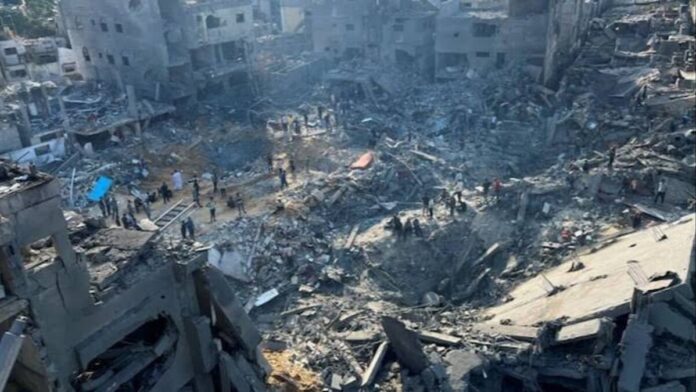As Israel’s attacks on the Jabalia refugee camp, which UN human rights officials said may have been war crimes, claimed at least 195 Palestinian lives, more foreign nationals made preparations to evacuate the embattled Gaza Strip on Thursday. As part of an agreement between Israel, Egypt, and Hamas, at least 320 foreign nationals on a first list of 500, together with other Gazans with serious injuries, entered Egypt on Wednesday.
Those in the evacuation included passport holders from Australia, Austria, Bulgaria, the Czech Republic, Finland, Indonesia, Italy, Japan, Jordan, the United Kingdom, and the United States.
In order to allow more foreigners to leave, border officials in Gaza announced that the crossing will reopen on Thursday. A diplomatic source said some 7,500 foreign passport holders would leave Gaza over about two weeks.
In an effort to destroy the Islamist organisation following its cross-border incursion into southern Israel on October 7, Israel has launched air, sea, and land bombs on Gaza. Israel said that Hamas had kidnapped more than 200 captives and killed 1,400 people, the most of them civilians.
The Palestinian Red Crescent reported that loud explosions were heard in the early hours of Thursday near the heavily crowded al-Quds hospital in Gaza City. The hospital has already received warnings from Israeli authorities to evacuate right away, but U.N. officials have stated that doing so would put patients in danger.
Two Hamas military leaders were slain by Israel’s strikes on Tuesday and Wednesday in Jabalia, the largest refugee camp in Gaza. According to Israel, the group purposefully put Gazan residents in danger by having command centres and other “terror infrastructure under, around, and within civilian buildings.”
At least 195 Palestinians were killed in the two Israeli attacks on Jabalia, according to the government media office in Gaza, which is controlled by Hamas. Another 120 are still missing beneath the debris. It claimed in a statement that there were at least 777 additional injuries.
On Wednesday, Palestinians laboriously dug through debris in an attempt to find stranded casualties. One observer remarked, “It’s a massacre.”
According to UN human rights officials, attacking the camp could be considered a war crime.
“Given the high number of civilian casualties & the scale of destruction following Israeli air strikes on Jabalia refugee camp, we have serious concerns that these are disproportionate attacks that could amount to war crimes,” the U.N. High Commissioner for Human Rights wrote on social media site X.
Israel’s attack and tighter blockade are making the situation in the beachfront enclave more dire amid rising international appeals for a humanitarian pause in hostilities. We’re low on fuel, food, water to drink, and medication.
U.S. passport holder Dr. Fathi Abu al-Hassan, who was waiting to enter Egypt on Wednesday, spoke of the terrible situation in Gaza, where there was no food, water, or shelter.
“We open our eyes on dead people and we close our eyes on dead people,” he stated.
Fuel shortages have caused hospitals, particularly Gaza’s sole cancer hospital, to struggle. Fearing that fuel would be diverted for military use by Hamas fighters, Israel has refused to allow humanitarian convoys to deliver supplies.
In a televised news conference on Thursday, Ashraf Al-Qudra, a spokesman for the Gaza health ministry, stated that fuel shortage had caused the Indonesian Hospital’s primary power generator to malfunction.
The hospital would no longer be able to run oxygen generators and mortuary refrigerators, so it was moving to a backup generator. “If we don’t get fuel in the next few days, we will inevitably reach a disaster,” he said.
It was scheduled on Thursday that U.S. Secretary of State Antony Blinken would leave for his second trip to Israel in less than a month. According to his spokesperson, he will meet with Israeli leaders on Friday, including Prime Minister Benjamin Netanyahu, to express support and to reiterate the imperative of reducing Palestinian civilian casualties.
Blinken will also make a visit in Jordan, one of the few Arab countries with ties to Israel that have been normalised. Jordan removed its ambassador from Tel Aviv on Wednesday, pending Israel’s cessation of its attack on Gaza. Israel expressed regret over Jordan’s choice.
Blinken will emphasise in Jordan the value of preserving civilian lives and restate American commitment to preventing Palestinians from being forcibly expelled from Gaza, an issue that the Arab world is becoming increasingly concerned about, according to Miller.
According to Miller, he will continue the negotiations spearheaded by Qatar and Egypt to secure the release of every hostage detained by Hamas.
Also on Thursday, a plan worth $14.3 billion in aid for Israel might be approved by the US House of Representatives with Republican backing.
However, given the strong opposition it faces in the Democratic-controlled Senate and the White House’s veto threat, it is unlikely to become law. A $106 billion measure, as requested by President Joe Biden, would finance humanitarian aid, border security, Ukraine, and Israel.
After weeks of airstrikes and artillery barrages, Israel dispatched ground soldiers into Gaza late last week in retaliation for the unexpected Hamas offensive that caught Israelis off guard on October 7.
Since October 7, Israeli strikes have killed at least 8,796 Palestinians in the small coastal enclave, including 3,648 children, according to the Gaza Health Ministry.




